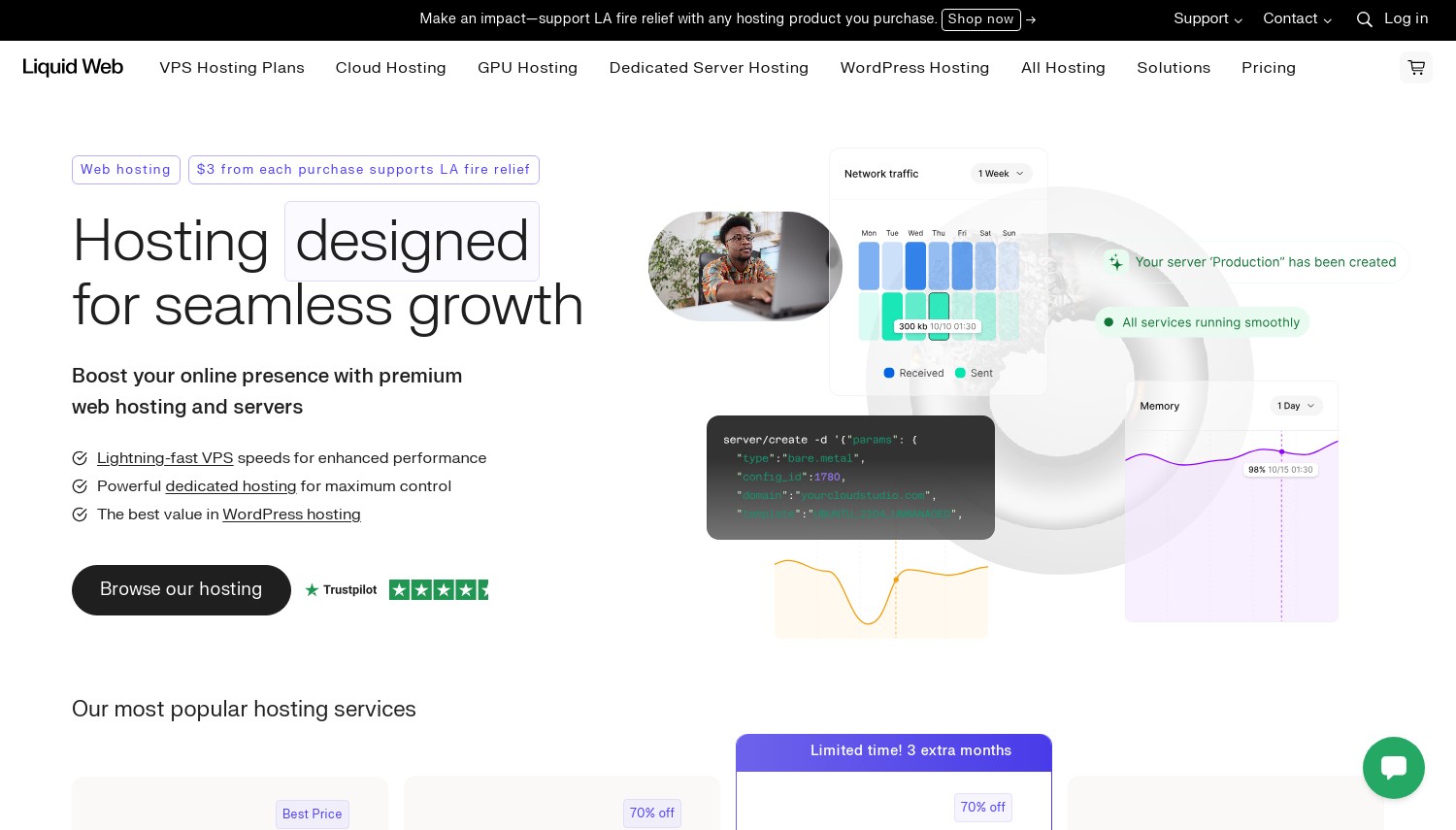Top 12 Cloud Hosting Companies in 2025
Selecting the right cloud hosting provider is crucial for getting the best out of your website. With so many excellent providers to choose from, narrowing down the best solution for your specific project can feel like quite challenging. But we're here to help!
In this guide, we’ve reviewed and ranked the 12 best cloud hosting companies based on reliability, speed, pricing, customer support, and key features.
ScalaHosting - Customizable VPS Solutions
Pros
- Competitive pricing with a starting point of $29.95/month for robust features.
- Custom SPanel offering greater security and ease of use compared to cPanel.
- Anytime money-back guarantee, offering flexibility and peace of mind to users.
- Free site migrations, easing the transition for new customers.
- Scalability that allows users to adjust resources based on their needs without downtime.
Cons
- cPanel not included as standard; considered an extra expense for those accustomed to it.
- While the entry plan is highly competitive, larger businesses may find more cost-effective solutions elsewhere as their needs grow.
ScalaHosting emerges as a compelling choice for both newcomers and seasoned users in the web hosting space. The starting plan at $29.95 per month for a 12-month commitment makes ScalaHosting an attractive entry point into the cloud hosting market. The renewal price, while subject to change, typically reflects the initial offering, ensuring that customers are aware of their financial commitments over the long term.
This starter package includes 2 CPU cores, 4 GB RAM, and 50 GB NVMe SSD storage, significantly speeding up website performance compared to traditional SATA SSDs. With automatic offsite backups and unmetered bandwidth, users are well-equipped to manage their online presence effectively. Also, every plan comes with built-in CloudFlare CDN and brute-force attack protection, enhancing both website speed and security.
ScalaHosting takes pride in its custom control panel, SPanel, designed to give users more control over their web space. Compared to the industry-standard cPanel, SPanel is not only more secure - with real-time malware protection - it's also more lightweight and packed with features, able to run efficiently on a VPS with less than 1GB RAM. The panel includes a terminal directly integrated into the panel and integrated support, making it a comprehensive solution for web hosting management. Moreover, unlike cPanel, which starts at an additional $26.95 for 5 accounts, SPanel allows hosting of unlimited accounts and websites at no extra cost.
A unique aspect of ScalaHosting is its anytime unconditional money-back guarantee, extending for 30 days with a promise of prorated refunds. This means if customers decide to cancel their plan midway, they are eligible to receive a refund proportional to their remaining term, offering peace of mind and flexibility.
HostArmada - Reliable Cloud SSD Hosting
Pros:
- Fully-managed cloud SSD technology guarantees 99.9% uptime
- 24/7 access to expert technical support
- Lightning-fast speed and reliable security measures
Cons:
- No recurring discounts, leading to price increases on renewal
HostArmada emerges as a leading choice for managed cloud hosting, starting at a competitive price of $2.99. This initial pricing plan attracts users with its comprehensive package, including up to 300 websites, 250 GBNVMe storage, and unmatched performance with 200PHP workers, all under the assurance of a 45-day money-back guarantee. The scaling of prices upon renewal is designed to reflect the continuing value offered, with upgrades available to enhance storage, RAM, bandwidth, and other critical resources to keep pace with business growth.
The platform is celebrated for its ease of navigation, thanks to the inclusion of cPanel/WHM, making it incredibly user-friendly even for beginners. HostArmada provides a robust infrastructure with lightning-fast speeds and strong security measures to protect websites. Their 24/7 human-powered technical support is a highlight, ensuring that any issues are swiftly and effectively addressed, which is vital for maintaining site uptime and performance.
Choosing HostArmada means opting for a worry-free hosting experience. Their fully-managed cloud SSD technology ensures 99.9% uptime, making it a reliable choice. Furthermore, the provision of daily and local backups, free domains, SSL certificates, and an array of additional features, solidify its position as a top contender for businesses and developers seeking a managed cloud hosting solution that combines performance, reliability, and ease of use.
Hostinger - Affordable Cloud Hosting for Startups
Pros
- Highly affordable plans with a 30-day money-back guarantee
- User-friendly control panel and website builder
- Comprehensive security features included
- Global server presence ensures good website performance
- Round-the-clock customer support via live chat
Cons
- Limited server locations compared to some competitors
- No dedicated hosting option for those requiring maximum server resources
- Renewal rates are higher than the introductory offer
- Lack of support for Windows-based hosting, limiting options for certain users
While on the journey of selecting a cloud hosting provider, Hostinger emerges as a compelling choice due to its blend of affordability and feature-rich offerings. With pricing starting as low as $1.99 for shared hosting and cloud hosting plans beginning at $9.99, Hostinger caters to a wide array of needs, from personal blogs to more demanding eCommerce sites. These initial rates are enticing, especially when considering the breadth of services and the scalability options provided. Upon renewal, prices adjust to standard rates, securing long-term value for your investments.
The cornerstone of Hostinger's appeal lies in its balance between cost-effectiveness and the provision of substantial resources. Even at its most basic tier, you're granted 100 GB SSD storage, 1GB RAM, and 2 CPU cores, underlining their commitment to delivering robust hosting solutions. For those whose sites demand even more power and resources, upgraded plans offer up to 300 GB SSD storage, 12 GB RAM, and 6 CPU cores, ensuring your website can handle significant traffic without a hitch.
Hostinger's appeal isn't merely about the numbers; it's about the ease of use and management. The inclusion of a free domain name for the first year, unlimited SSL certificates, and access to a user-friendly website builder streamlines the web development process. In addition, the promise of a 99.9% uptime guarantee and enhanced security measures, including DDoS protection, malware scans, and automatic backups, solidify trust in the reliability and safety of their hosting environment.
Choosing Hostinger also means enjoying a hassle-free experience from the start, with instant account setup and an intuitive control panel that demystifies website management. Should challenges arise, their 24/7 customer support is praised for its efficiency and helpfulness, underscoring their commitment to customer satisfaction.
Moreover, with a 30-day money-back guarantee, Hostinger offers peace of mind, allowing you to test their services risk-free. This policy reflects their confidence in the quality of their offerings and their priority for customer confidence.
Contabo - High Performance at Low Cost
Pros
- Affordable pricing plans for both VPS and dedicated servers
- High-performance SSD storage and unlimited bandwidth
- Flexible server locations across Europe, America, and Asia
- Anytime money-back guarantee for peace of mind
Cons
- Setup fee for monthly billing cycle
- Limited managed services options
Contabo has made a significant impact on the hosting market with its competitively priced VPS and dedicated server offerings. For those looking for an affordable entry into hosting without sacrificing quality, Contabo's pricing starts at an attractive point of $3.99 per month. This price point is for their VPS S SSD plan, which includes 4 CPU cores, 8 GB of RAM, 50 GB of SSD storage, and unlimited bandwidth. Understandably, this makes Contabo an appealing option for startups, small businesses, and personal websites.
A standout feature of Contabo is its commitment to providing high-performing hardware at a low cost. Moreover, they tend to refresh their hardware frequently, ensuring customers get access to up-to-date technology. Another significant benefit is the flexibility in data center locations, with options in Europe, America, and Asia, allowing for better reach and faster website loading times for your target audience.
Contabo also offers a no-fuss, anytime money-back guarantee, which is quite unique in the hosting space. This shows their confidence in the service provided and offers peace of mind to customers who might be on the fence about committing to a long-term hosting plan.
Choosing Contabo can be a wise decision due to their cost-effective plans, reliable service, and excellent customer support. Their hosting solutions cater to a wide range of needs, making it suitable for various types of projects. From simple websites to complex applications, Contabo provides the necessary resources to ensure your online success.
Kamatera - Flexible and Scalable Cloud Services
Pros
- Instant scalability to efficiently handle varying web traffic
- A broad range of configurations up to 1174 server setup variations
- Pay-as-you-go billing model for optimized costs
- Exceptional uptime of 99.95%, ensuring reliability
- User-friendly control panel for ease of management
Cons
- Can be overwhelming for beginners due to the sheer number of options
- No option for shared hosting, focusing solely on cloud VPS servers
- Additional services and add-ons can quickly increase the overall cost
Kamatera distinguishes in the cloud hosting market with its highly adaptable and efficient cloud server solutions. Offering services at as low as $0.029 per hour, Kamatera makes itself accessible to a wide range of businesses, from startups to well-established enterprises. This pricing model includes configurations such as 2 vCPUs, 4 GB RAM, 60 GB SSD storage, plus 500 GB bandwidth, ensuring a robust foundation for various online projects. Kamatera doesn't mention renewal prices, which implies the costs remain consistent, barring any changes in your usage or service enhancements.
Choosing Kamatera for cloud hosting means benefiting from instant scalability, which allows businesses to adjust resources according to their needs without facing downtime. This flexibility is invaluable for handling traffic spikes or scaling operations. The cloud infrastructure guarantees 99.95% uptime, safeguarding against significant disruptions. While the service is comprehensive, it's worth noting there is a 30-day free trial, providing an opportunity to gauge the service without any initial commitment.
Kamatera's appeal is not just in its technology but also in the simplicity it offers. Setting up a server is straightforward and takes less than a minute, a crucial feature for businesses eager to launch or expand their digital footprint quickly. Moreover, the array of services including cloud servers, block storage, and dedicated resources ensures that Kamatera can cater to the diverse needs of the digital landscape.
Given its scalability, reliability, and flexibility, Kamatera is especially suited for businesses looking to adapt to the digital age's demands. The pricing model, coupled with the level of control and customization it offers, ensures that enterprises can craft a hosting solution that precisely meets their needs without overcommitting resources. The professional and friendly support team rounds off Kamatera's offer, making it a compelling choice for those prioritizing both performance and service quality in their cloud hosting provider.
FastComet - Global Cloud Hosting with Free CDN
Pros
- Competitive starting price with transparent renewal rates
- 15 GB of SSD storage on the basic plan, ensuring fast website performance
- Free website migration and daily backups enhance security and convenience
- 45-day money-back guarantee offers ample time to evaluate services
Cons
- Limited resources on the entry-level plan may not suit larger websites
- Some advanced features are reserved for higher-tier plans
FastComet is a hosting provider that offers a wide range of hosting services, catering to both beginners and advanced users. The entry-level plan starts at $2.95 per month, presenting an attractive choice for those just starting out or operating on a tight budget. This plan offers 15 GB of SSD storage, which ensures quick access and loading times for websites, along with 2 GB of RAM and unmetered bandwidth to support steady website traffic without overage charges. One key selling point of FastComet is its focus on security, with features like a free Let's Encrypt SSL certificate, daily and weekly backups to safeguard your data, and a web application firewall to protect against online threats.
Customers considering FastComet will be pleased to find a 45-day money-back guarantee, allowing ample time to test their services risk-free. This is a longer period than many competitors offer, providing added assurance to new customers. The hosting service is straightforward, making it less intimidating for users new to hosting, while still offering ample flexibility and tools for more technically savvy users. FastComet also prides itself on transparency, with no significant price hikes upon renewal - a rare find in the hosting industry. The renewal for the entry-level plan remains affordable, ensuring long-term value for customers.
Choosing FastComet as your hosting provider means enjoying benefits such as free website migration, which can be a major convenience for those looking to switch from another host. Their round-the-clock support is responsive and knowledgeable, providing peace of mind that help is available whenever needed.
ChemiCloud - User-Friendly Cloud Hosting Experience
Pros
- Competitive pricing with significant value for the initial term
- Easy to use interface that simplifies website management
- Comprehensive 24/7 customer support through live chat, phone, and email
- 45-day money-back guarantee for risk-free testing
- Free daily backups and a free SSL certificate ensure data security and user trust
Cons
- Renewal rates are significantly higher than the introductory offer
- Limited data centers may affect website speed for visitors in certain regions
ChemiCloud offers a balanced combination of reliable hosting services, affordability, and user-friendly features. With pricing starting at $3.95/month for shared hosting plans, users can enjoy a range of benefits designed to support websites of all sizes. This introductory rate applies to a 3-year term with the cost moving to $9.95 upon renewal. Plans are rich in features, including SSD storage starting from 20 GB, 1 GB RAM, and unmetered bandwidth, which ensure quick and reliable website access for visitors. Moreover, ChemiCloud's commitment to customer satisfaction is evident in their generous 45-day money-back guarantee, giving new customers the confidence to try their services risk-free.
Why should someone choose ChemiCloud? Their hosting solutions are optimized for performance and security, with a focus on delivering the best possible user experience. Whether you're launching a new blog, running a small business website, or managing an online store, ChemiCloud's hosting platforms provide the scalability to grow with your needs. This flexibility is coupled with 24/7 customer support, to assist you whenever you encounter an issue or need guidance in maximizing your hosting environment.
SiteGround - Managed Cloud Hosting with Top-notch Support
Pros
- Fully customizable cloud servers
- Powered by Google Cloud for enhanced performance
- Daily backups and free SSL certificates
- 24/7 world-class customer support
- Free Cloudflare CDN
Cons
- No support for Windows servers
- Higher cost barrier compared to other providers
- Complex security features may be challenging for novices
SiteGround offers a premium cloud hosting service with prices starting from $80/month, with renewal prices slightly higher, depending on the plan chosen. This initial investment grants users access to a robust platform powered by Google Cloud, ensuring high reliability and outstanding performance. For the starting price, users are privy to 2 CPU cores, 4 GB memory, 40 GB SSD storage, and 5 TB data transfer, making it an excellent choice for businesses in need of scalable and powerful hosting solutions. Furthermore, SiteGround promotes peace of mind through daily backups and instant backup options, ensuring that your data is always secure and recoverable at a moment's notice.
For those hesitant to commit, SiteGround offers a 30-day money-back guarantee on all cloud hosting plans, allowing users to test the service risk-free. The provider stands out for its dedication to customer satisfaction, boasting near-perfect support ratings thanks to its 24/7 availability via live chat, phone, and help desk tickets. It's particularly noted for its customizable configurations, with options to adjust CPU, RAM, and storage to meet the specific needs of any website or application.
Why choose SiteGround for your hosting needs? Apart from its high-performance infrastructure, SiteGround provides free Cloudflare CDN, contributing to faster website load times globally. Its partnership with Google Cloud underpins a commitment to top-tier performance and reliability. The range of developer tools, free SSL certificates for every domain, and a KVM-based environment for cloud servers underscore its suitability for managing CMS platforms like WordPress, Drupal, and Joomla efficiently.
DreamHost - Best for WordPress Cloud Hosting
Pros
- Flexible cloud server options across various OS platforms
- Competitive pricing with a pay-for-what-you-use model
- Free 100GB block storage for all accounts
- Robust performance and security features
- Generous money-back guarantee
Cons
- Shared Starter plan lacks email features
- No telephone support, potentially limiting immediate assistance
- Lacks Windows-based server options, limiting flexibility for some users
DreamHost stands as a pioneering figure in the cloud hosting spectrum, offering scalable and flexible solutions tailored for a diverse range of needs. From small businesses to developers seeking robust options for their projects, DreamHost's pricing model is designed to cater to various requirements without overburdening financial resources. With cloud services starting at just $0.0075 per hour, users have access to a foundational tier that includes 512MB RAM, 1 vCPU, free bandwidth, and 80GB SSD storage, maxing out at $4.50 per month for up to 600 hours of service. This approach not only ensures affordability but also introduces a layer of transparency and predictability in billing.
Apart from the competitive pricing, DreamHost further cements its value proposition with a generous addition of 100GB block storage at no extra cost for every account. Those in need of more can secure additional chunks of 100GB storage for a mere $10, revealing DreamHost's mission to deliver high-value hosting services at minimal costs. This blend of affordability and scalability is complemented by a robust array of features aimed at optimizing performance, security, and flexibility.
Undoubtedly, DreamHost's edge in supporting a wide array of OS options, including BSD, Linux, or Windows platforms, sets it apart, enabling it to cater to a broader audience. Its infrastructure, leveraging fast SSD disks, next-gen processors, and accelerated networks, is open-source - a decision that not only underscores its commitment to transparency but also enhances its security posture.
However, DreamHost acknowledges its limits, admitting that its services may not be the best fit for large enterprises requiring more than 8 vCPU and 16GB RAM. This candidness, coupled with DreamHost's expansive suite of services -including shared, VPS, dedicated, and cloud hosting options - demonstrates its genuine commitment to serving its customer base as effectively as possible.
A2 Hosting - Fast and Reliable Cloud Hosting
Pros
- SSD storage and Turbo servers for faster website loading times.
- 24/7 responsive customer support.
- Free site migration makes switching hosts easier.
- Uptime guarantee for reliable site performance.
- Good money-back guarantee provides a risk-free trial.
Cons
- Lacks Windows server options, limiting platform diversity.
- Relatively high renewal rates following the introductory period.
- Limited number of data centers, which may affect site speed based on geographic location.
A2 Hosting stands out for its emphasis on delivering fast website performance through its use of SSD (Solid State Drives) and Turbo servers designed to enhance your site's loading speed. Beginning at an inviting price of $2.99, A2 Hosting has structured their services to cater to a diverse clientele, ranging from individuals to small and medium-sized businesses. While the initial price is appealing, it's important to note that renewal rates ascend to higher figures, a common practice amongst web hosting providers, to ensure sustainability and quality service in the long run.
The core offering includes plans that feature free site migration, allowing for a hassle-free transition from your current hosting provider. This service significantly reduces the complexity and technical challenges often associated with site migration. For those concerned about the reliability of their website, A2 Hosting assures an uptime guarantee, ensuring that your site remains operational with minimal downtime. This is crucial for businesses where even a brief period of inaccessibility can lead to lost revenue.
A remarkable attribute of A2 Hosting is its customer support, recognized for its responsiveness and expertise. Whether you're dealing with technical issues or have inquiries about your hosting plan, their 24/7 support team is readily available to assist. In terms of refund policies, A2 Hosting offers a good money-back guarantee plan, providing a safety net for users to try their services risk-free.
A2 Hosting's plans are especially suitable for those prioritizing web performance and reliability. With a focus on speed, courtesy of its SSD storage and Turbo servers, websites hosted on A2 benefit from faster load times and smoother operation, enhancing user experience -a critical factor in SEO and customer satisfaction.
Hostwinds - Fully Managed Cloud Solutions
Pros
- Flexible and scalable real-time server configurations
- No long-term contracts with pay-as-you-go billing
- Support for a wide range of operating systems
- Customizable plans with optional upgrades
Cons
- Not every plan includes a Windows server option
- A shorter window for money-back guarantee compared to some competitors
When it comes to finding a cloud server that matches both your budget and performance requirements, Hostwinds emerges as a compelling choice. With pricing starting at just $0.026375 per hour, Hostwinds offers a scalable and flexible solution to web hosting that avoids long-term contract commitments. This approach allows for a more streamlined budget management, catering to businesses and developers who prefer a pay-as-you-go model.
Hostwinds presents a variety of plans, including a popular option that features 2 CPUs, 4 GB RAM, 75 GB SSD storage, and 2 TB of monthly bandwidth. This plan is especially suited for websites that need to scale resources quickly to meet surges in web traffic or for development projects that require temporary but powerful server capabilities. The option for hourly billing underlines Hostwinds' adaptability to different project durations and scope.
For those requiring a more managed solution, Hostwinds offers managed cloud services that support a range of operating systems including Debian, Fedora, CentOS, Ubuntu, and Windows. This flexibility simplifies the deployment of cloud servers tailored to specific project or business needs. Moreover, with the inclusion of a proprietary control panel for VPS management, users can easily manage their cloud environment, leveraging snapshots for quick backups.
Enhanced with optional upgrades like cPanel, backups, SSDs, HDDs, and an enterprise firewall, Hostwinds' offerings are comprehensive. Although no explicit mention of a money-back guarantee is noted, the granular billing method adds a layer of financial security, allowing users to only pay for what they use.
Choosing Hostwinds as your cloud hosting partner means opting for a provider that excels in offering a balance between price and performance. This is particularly beneficial for small to medium businesses, eCommerce sites, and developers working on dynamic projects.
Liquid Web Inc. - Premium Managed Cloud Services
Pros
- Fully managed services across all plans
- High-performance SSD storage enhancing website load times
- Robust security with DDoS protection and free SSL
- Automatic resource scaling to efficiently manage traffic spikes
- Exceptional customer support, available 24/7/365
- Transparent pricing with a starting point accessible to small businesses
Cons
- Higher price points for premium features and plans
- Additional costs for DDoS protection and cloud backups
- No support for Windows OS in certain hosting plans
- Plans on the pricier side, with few refund options
Liquid Web has established itself as a premium choice in the hosting sphere, boasting a range of cloud hosting plans that cater to various business needs, from small businesses to large enterprises. The pricing spectrum starts at an appealing $5/month for their Cloud VPS plan, which provides 1 vCPU, 1 GB RAM, and 30 GB SSD storage. This basic package is ideal for small businesses seeking an entry into cloud infrastructure without a hefty investment. For businesses with greater demands, Liquid Web offers plans that scale up significantly, culminating in high-end options that include robust features such as 8 vCPU, 32 GB RAM, and 640 GB SSD storage, ensuring that the hosting environment grows with your business needs.
One of the standout features of Liquid Web's pricing structure is its transparency and the inclusion of significant value in each plan. Even at the entry level, businesses benefit from essential features like automatic scaling, which intelligently adjusts resources in real-time based on traffic, ensuring cost-efficiency by only charging for used resources. For those requiring more substantial resources, the dedicated cloud servers provide enterprise-grade hardware with the flexibility of cloud hosting, though these premium options come with a higher price tag, starting from $149 per month.
Liquid Web's commitment to reliability is underlined by their 100% uptime guarantee, backed by a Service Level Agreement that offers credits should this promise not be met. While some may find the pricing on the higher end, the value offered through features like advanced security, automatic backups, and especially their exceptional customer support, presents a compelling case for the investment. Additionally, the absence of a clear refund policy emphasizes the importance of understanding your hosting needs before commiting to a plan.
HowToHosting.Guide Selected ScalaHosting Reviews for Cloud

Trustpilot User
from Norway

Published on: 17/09/2024
"Had a technical issue with managed cloud server. Got experienced technical support via chat within seconds, and issue was resolved within a minute or so. Chat support is consistently fast and helpful with ScalaHosting. Overall great experience after being with ScalaHosting for more than a year."

Trustpilot User
from South Africa

Published on: 07/05/2024
"This is the best cloud service,"

Trustpilot User
from Spain

Published on: 10/04/2024
"Just starting out the first time with a VPS cloud server and there are many little details to learn about setting up things. But with the always present chat support, it is easy, you get help and learn while doing things first time. Also, the SPanel is great, very clear and simple to use."
10 Most Reviewed Cloud Hosting Providers (Feb 2025)
5 Cheapest Cloud Hosting Plans (from $1.07 to $1.38)

 ScalaHosting
ScalaHosting

 HostArmada
HostArmada
 Hostinger
Hostinger

 Contabo
Contabo

 Kamatera
Kamatera
 FastComet
FastComet
 ChemiCloud
ChemiCloud
 SiteGround
SiteGround
 DreamHost
DreamHost
 A2 Hosting
A2 Hosting
 Hostwinds
Hostwinds
 Liquid Web Inc.
Liquid Web Inc.







































